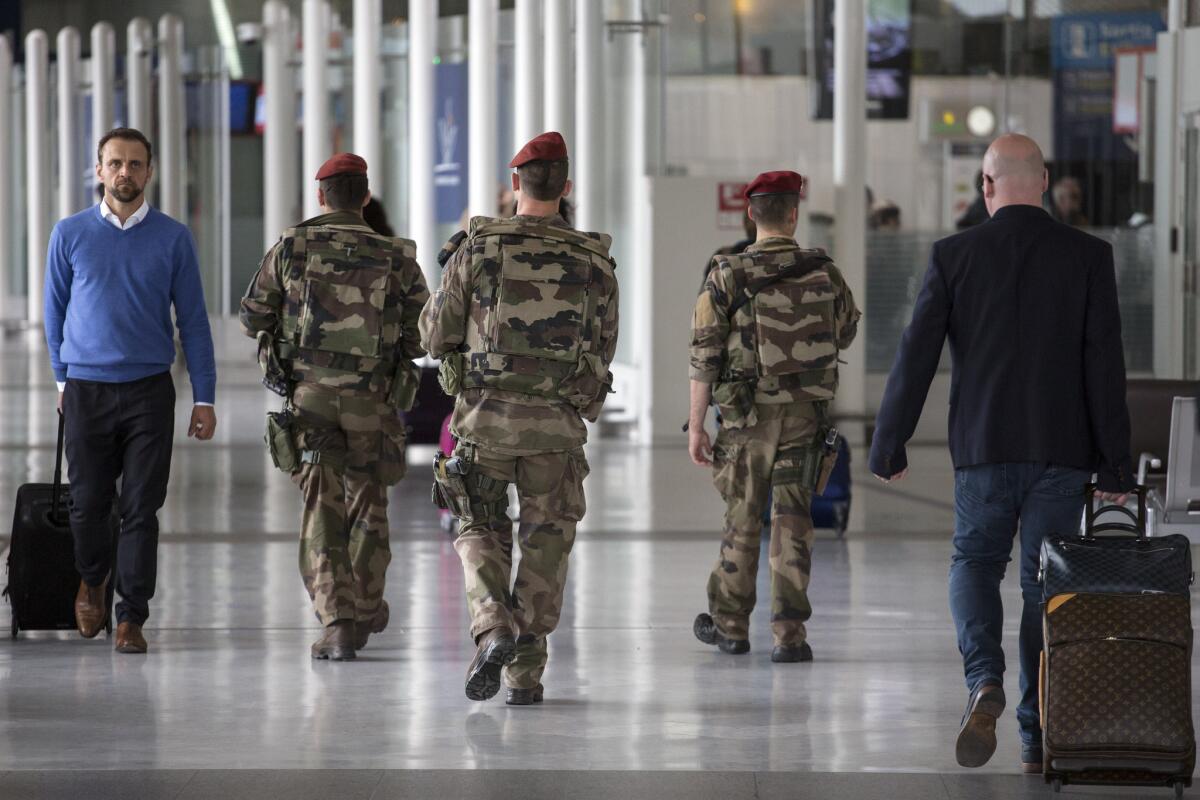EgyptAir crash raises new questions about European airport security

- Share via
Reporting from London — Security at European airports came under fresh scrutiny Friday as investigators struggled to explain what caused the EgyptAir crash.
At Paris’ Charles de Gaulle Airport, where flight 804 began its ill-fated journey, officials were scouring surveillance cameras, conducting passenger background checks and reviewing who had access to the plane prior to takeoff.
Major soul-searching already has begun into what more can be done to protect passengers.
See more of our top stories on Facebook >>
“In terms of security, the chain is only as strong as the weakest link,” said Bob Mann, a former airline executive and industry analyst. “The problem is you have to be 100% right all the time.”
In terms of security, the chain is only as strong as the weakest link. The problem is you have to be 100% right all the time.
— Bob Mann, a former airline executive and industry analyst
Europe has been in a heightened state of alert since the recent terrorist attacks in Paris and Brussels. Security at Europe’s airports is governed by European Union law, but some airports and airlines choose to exceed the minimum requirements.
For example, since the March terror attack at the Brussels airport, where suicide bombers detonated a suitcase filled with explosives inside a terminal at the airport, only people with valid identification and a ticket have been allowed to enter the check-in area.
Paris also has adopted aggressive tactics to reassure travelers. Thousands of extra soldiers, border and customs guards and security personnel were deployed to the city’s three main airports after the November attacks that left 130 dead.
After the Brussels attacks, the Paris airports added more security measures, including increased video surveillance, more random bag checks, heightened patrols and greater use of sniffer dogs. Specially trained staff look for unusual behavior.
While those measures may ease fears of travelers, experts say there are still significant gaps in security.
Paul Charles, an independent aviation analyst based in London, said more checks conducted by people — as opposed to machines — should take place in and around airplanes. “That’s the most urgent thing that could be done,” he said.
“You’ve got to stay one step ahead of the terrorists,” he said. “Terrorists are getting more advanced, and therefore security teams themselves need to be more advanced with this threat.”
Of particular concern is the so-called “insider threat.” Cleaning, catering, baggage handling and other jobs give large numbers of workers access to planes.
Many work for third-party contractors, complicating the vetting process for security clearance.
At Charles de Gaulle, the second busiest airport in Europe, about 86,000 staff have “red badges,” giving them access to secure areas. Their clearance is reviewed every three years by local authorities.
“Airports, by their nature, employ large quantities of low-paid, transient workers with a high staff turnover rate,” said Philip Baum, a London-based security consultant who specializes in passenger profiling techniques. “It is very difficult for the authorities to do effective background checks.”
Still, Baum said that Europe is “light years” ahead of the U.S. when it comes to airport security.
“The threat in Europe is probably greater than in the United States, but they screen staff when they arrive at work every day in Europe,” he said.
In the aftermath of the Brussels attacks, French officials went through the lockers of about 4,000 employees at Paris airports and revoked security passes of 70 people “for the phenomenon of radicalization,” Augustin de Romanet, head of the Paris Aeroport authority, said at the time.
Eric Moutet, a lawyer representing some of the affected employees, all of whom are Muslim, said militants have attempted to recruit airport staff.
“There is effectively recruitment going on at the airports, that’s clear,” he told the BBC. “There are people who are being radicalized. ... The authorities have their work cut out with this problem.”
In the EgyptAir crash this week, there is conjecture that someone could have tampered with the Airbus A320 even before it landed in Paris. The plane made stops in Eritrea, Cairo and Tunisia before it embarked on its final journey from Paris to Cairo.
In the absence of a black box recorder, the mystery surrounding the crash continues to intensify, leaving passengers jittery and forcing authorities to review security procedures.
Yet air travel remains far safer than driving.
“It’s psychological,” said Norman Shanks, professor in aviation security at Britain’s Coventry University. “We think we can control our destiny when we’re driving. But we can’t control our destiny when we’re in a plane.”
ALSO
Terrorists may have brought down EgyptAir flight, officials say
Counter-terrorism security increases at LAX after EgyptAir Flight 804 disappears
What we know so far about the people who were on board EgyptAir Flight 804
Boyle is a special correspondent.
More to Read
Sign up for Essential California
The most important California stories and recommendations in your inbox every morning.
You may occasionally receive promotional content from the Los Angeles Times.










